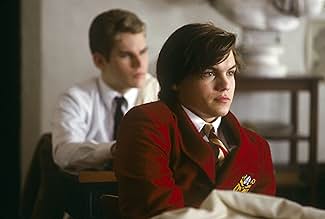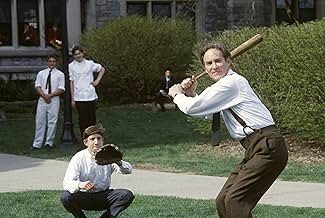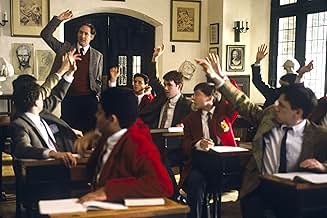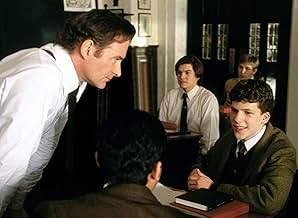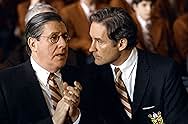IMDb RATING
6.9/10
18K
YOUR RATING
An idealistic prep school teacher attempts to redeem an incorrigible student.An idealistic prep school teacher attempts to redeem an incorrigible student.An idealistic prep school teacher attempts to redeem an incorrigible student.
- Awards
- 2 nominations total
Gabriel Millman
- Robert Brewster
- (as Gabe Millman)
- Director
- Writers
- All cast & crew
- Production, box office & more at IMDbPro
Featured reviews
There is no doubt that Kevin Kline is both a funny man and a fine comedic actor. However, as he has proved yet again, anything other than dramatic roles is a waste of his acting talent.
In the finest film he has made, he is superb in his role as school teacher and mentor to a generation of boys -- including one particular bad egg.
Excellently cast, scripted and acted, this is a must see.
In the finest film he has made, he is superb in his role as school teacher and mentor to a generation of boys -- including one particular bad egg.
Excellently cast, scripted and acted, this is a must see.
From `Goodbye Mr. Chips' in the 1930's to `Dead Poet's Society' in the 1980's, the movies have had a long-running love affair with inspirational, sentimental stories set at ivy-covered, collegiate-gothic, all-male prep schools. These films inevitably center around a beloved teacher and the lifelong bond he forges with his devoted students.
The latest addition to the genre a successful one is `The Emperor's Club,' with Kevin Kline assuming the role of the teacher who considers it his duty not only to instruct his students in the details of classical history but to mold them into men of integrity and character in the process. `The Emperor's Club' follows the standard formula up to a point. William Hundert is the most highly respected faculty member at St. Benedict's Academy. He is able to bring the history of the ancient Greeks and Romans to vivid life for his admittedly highly motivated young charges. Then, one day, into his classroom strides Sedgwick Bell, a bright, highly unmotivated student who would rather mock the stuffiness of education and inspire his buddies to feats of rabblerousing than devote his life to the serious pursuit of academia. It, thus, becomes Hundert's job to turn Sedgwick around, a feat that always seems much easier to accomplish in the movies than it ever is in real life.
`The Emperor's Club,' after its rather conventional beginning, deviates from its predecessors in one key respect: Hundert, though a man of values and integrity, is not above compromise himself, and he winds up making a very serious one, the ramifications of which he has to live with for many years to come. Rather than showing him as some sort of saintly figure, screenwriter Neil Tolkin (working from a short story by Ethan Canin) and director Michael Hoffman allow Hundert's humanity to shine through. He is a flawed individual who permits personal feelings to cloud his judgments and who is willing, once he has created a problem, to allow the truth of his own guilt to remain hidden even when innocent victims suffer as a result of his actions. `The Emperor's Club' is also notable for its clear-eyed recognition that not all situations in life need have a satisfying resolution, that some people simply do not acknowledge their own failings and, therefore, never develop into morally superior people no matter how many experiences life throws at them. Yet, what breaks Hundert's heart is the recognition he comes to that such a person is often times more highly rewarded by the world than the man who follows along the straight-and-narrow path all his life.
Kline gives a superb performance as Hundert, capturing the quiet dignity, understated passion and conflicted conscience of a man who loves his boys and who tries to do the right thing but who, like the rest of us, doesn't always succeed in doing so. Emile Hirsch is also excellent as young Sedgwick, the boy whose need for attention and lack of moral guidance from his father lead him to accept the winning-at-all-cost philosophy to get him through life.
`The Emperor's Club,' despite having its roots firmly planted in a grand storytelling tradition, still manages to take us into new territory from time to time and its recognition of the importance of education and academics (we actually get to learn a little about Roman history while watching the movie) makes it virtually unique among films of its time.
The latest addition to the genre a successful one is `The Emperor's Club,' with Kevin Kline assuming the role of the teacher who considers it his duty not only to instruct his students in the details of classical history but to mold them into men of integrity and character in the process. `The Emperor's Club' follows the standard formula up to a point. William Hundert is the most highly respected faculty member at St. Benedict's Academy. He is able to bring the history of the ancient Greeks and Romans to vivid life for his admittedly highly motivated young charges. Then, one day, into his classroom strides Sedgwick Bell, a bright, highly unmotivated student who would rather mock the stuffiness of education and inspire his buddies to feats of rabblerousing than devote his life to the serious pursuit of academia. It, thus, becomes Hundert's job to turn Sedgwick around, a feat that always seems much easier to accomplish in the movies than it ever is in real life.
`The Emperor's Club,' after its rather conventional beginning, deviates from its predecessors in one key respect: Hundert, though a man of values and integrity, is not above compromise himself, and he winds up making a very serious one, the ramifications of which he has to live with for many years to come. Rather than showing him as some sort of saintly figure, screenwriter Neil Tolkin (working from a short story by Ethan Canin) and director Michael Hoffman allow Hundert's humanity to shine through. He is a flawed individual who permits personal feelings to cloud his judgments and who is willing, once he has created a problem, to allow the truth of his own guilt to remain hidden even when innocent victims suffer as a result of his actions. `The Emperor's Club' is also notable for its clear-eyed recognition that not all situations in life need have a satisfying resolution, that some people simply do not acknowledge their own failings and, therefore, never develop into morally superior people no matter how many experiences life throws at them. Yet, what breaks Hundert's heart is the recognition he comes to that such a person is often times more highly rewarded by the world than the man who follows along the straight-and-narrow path all his life.
Kline gives a superb performance as Hundert, capturing the quiet dignity, understated passion and conflicted conscience of a man who loves his boys and who tries to do the right thing but who, like the rest of us, doesn't always succeed in doing so. Emile Hirsch is also excellent as young Sedgwick, the boy whose need for attention and lack of moral guidance from his father lead him to accept the winning-at-all-cost philosophy to get him through life.
`The Emperor's Club,' despite having its roots firmly planted in a grand storytelling tradition, still manages to take us into new territory from time to time and its recognition of the importance of education and academics (we actually get to learn a little about Roman history while watching the movie) makes it virtually unique among films of its time.
I can't help feel bit jealous when ever I see Private Schools in movies. My high school was unfortunately full of teachers who didn't give half a goddamn about you. And it was/is one of the most respected (read pretentious) in the country. I never learned one single thing that was actually of use to me and I believe going to such a place is mostly responsible for turning me into the faithless cynic that I am now.
In this movie Kevin Kline (a seriously underused actor) plays a history teacher who is dedicated to making sure his students grow up to be fine and morally sound, upstanding people. They all get along until Sedgewick Bell (Emile Hirsh)the hell-raising son of an arrogant Governor arrives in class. His grades are terrible but Mr. Hundert sees intelligence in the boy and struggles to push him in the right direction at the expense of the rest of the class who actually want and care for education. Over the years he comes to regret his mistakes but sees a chance to put things right again with a reunion of all his former students organised by Sedgewick who appears to want to put things right.
There are loads of Student/Teacher movies out there but what separates The Emperor's Club from the likes of Dead Poet's Society and Mr. Holland's Opus is that Mr. Hundert's teaching is never in doubt. But he is flawed. Kevin Kline is so good in the role that for most of the film I thought I was watching a real person and not a character. And doesn't he sound like Niles from Frasier?
I do wish I went to somewhere like St. Benedicts or at least had a teacher like Mr. Hundert. It seems that teachers who really care only exist in the movies As are students who are willing to learn. Or perhaps it's just my bad non-education that skews my opinion. Still, I know good movies when I see one and The Emperor's Club get's my recommendation if you're sick of Hollywood, massive budgets, overblown SFX and intrusive marketing and just want a good character drama.
In this movie Kevin Kline (a seriously underused actor) plays a history teacher who is dedicated to making sure his students grow up to be fine and morally sound, upstanding people. They all get along until Sedgewick Bell (Emile Hirsh)the hell-raising son of an arrogant Governor arrives in class. His grades are terrible but Mr. Hundert sees intelligence in the boy and struggles to push him in the right direction at the expense of the rest of the class who actually want and care for education. Over the years he comes to regret his mistakes but sees a chance to put things right again with a reunion of all his former students organised by Sedgewick who appears to want to put things right.
There are loads of Student/Teacher movies out there but what separates The Emperor's Club from the likes of Dead Poet's Society and Mr. Holland's Opus is that Mr. Hundert's teaching is never in doubt. But he is flawed. Kevin Kline is so good in the role that for most of the film I thought I was watching a real person and not a character. And doesn't he sound like Niles from Frasier?
I do wish I went to somewhere like St. Benedicts or at least had a teacher like Mr. Hundert. It seems that teachers who really care only exist in the movies As are students who are willing to learn. Or perhaps it's just my bad non-education that skews my opinion. Still, I know good movies when I see one and The Emperor's Club get's my recommendation if you're sick of Hollywood, massive budgets, overblown SFX and intrusive marketing and just want a good character drama.
Klein was superb as the bookish teacher intent on molding boys' characters' as well as teaching them. When he went out of his way to aid a troubled student he wound up depriving another causing some concerns for his conscience. The boy he felt he should help was the son of a bigshot politico who had no clue as to the needs of his son. Too busy being a power broker this ass arrogantly claimed he would mold his son's character. How? He's seldom around and when he is there is no communication between himself and his offspring. Like so many fathers, I wonder why they even want children knowing there is no inclination to interact with them. Brings to mind the Harry Chapin song "Cat's in the Cradle" which speaks to many, many dads. The Emma Willard School provided a nice backdrop for a very good film. 4 stars.
"The Emperor's Club" is a lot different than you would think. It does run a bit on cheesy sentimentality, but the ending is more than surprising considering the type of film this is.
It is a period-piece about a teacher (Kevin Kline) at a prestigious school for boys, and how he tries to "mould" a strong-willed fifteen-year-old boy. And if you want a hint at the surprise ending, don't read any farther, because I cannot control telling you that in the end he does not change the boy. Which is what truly amazed me. Most of the time in films like these, we see the free-spirited kid become proper and respectful. But not so here. This tale doesn't have a perfect teacher turning a bad boy into a perfect boy. It has a flawed teacher wasting years on one student. Years later at a party, he tells the boy, Sedgewick (now an adult), "as a teacher I have failed you." And that's what is so very different about this movie. It isn't as heavy on the drama as I thought it would be, and comes across a bit cheesy and fluffy at times, but the ending is more surprising than "The Sixth Sense" ever will be. It doesn't rely on tried-and-used methods, but goes for a new route. And just when you think that it's as depressing as it can get, the very, very end gives your spirit a bit of a boost.
Kline realizes that in those years that Sedgewick attended his class, he ignored the other students who were trying - and actually cared - about what they were doing. It kind of sheds a new light on the films where a teacher devotes time to one student in particular, because after seeing this film, I bet ten bucks next time you watch a film of the same roots you'll realize that the teacher is ignoring the other students. And "The Emperor's Club" exposes this. Kline's character is flawed, and while he is a good teacher, he makes mistakes, such as spending so much time on Sedgewick and bumping a smarter kid off of the school toga challenge, just so he can put Sedgewick in it (the challenge).
Kevin Kline isn't Otto here. "A$$hole!" is not a motto here. We've got Kline giving a thoroughly convincing performance as a 1970s all-boys school teacher. Kline's makeup at the end of the film is quite good as well, as opposed to something like "The Dish" where Sam Neil's makeup looks like it's about to fall off his face and his wig is about to be plucked off by a gust of wind.
I also liked the student actors in this film. The actors they got to play the various students were pretty good; in fact, many of them were very good. I hope their careers continue after this film, and as hateable as Sedgewick was in this film, the kid who played him was pretty convincing. You always know this when you start to like or dislike a character, much less hate or love them.
At the end of the film, I like the subtle differences in years. In the 1970s, a group of boys travel across a lake to check out the all-girls school, where nuns shoo them away. 28 years later, as Kline's character walks towards his schoolroom, we see boys and girls walking around. In 28 years society has changed, and it's funny to wonder if that group of boys from the 1970s ever thought that in 28 years, what they were paddling across a lake for would be right next to them.
It is a period-piece about a teacher (Kevin Kline) at a prestigious school for boys, and how he tries to "mould" a strong-willed fifteen-year-old boy. And if you want a hint at the surprise ending, don't read any farther, because I cannot control telling you that in the end he does not change the boy. Which is what truly amazed me. Most of the time in films like these, we see the free-spirited kid become proper and respectful. But not so here. This tale doesn't have a perfect teacher turning a bad boy into a perfect boy. It has a flawed teacher wasting years on one student. Years later at a party, he tells the boy, Sedgewick (now an adult), "as a teacher I have failed you." And that's what is so very different about this movie. It isn't as heavy on the drama as I thought it would be, and comes across a bit cheesy and fluffy at times, but the ending is more surprising than "The Sixth Sense" ever will be. It doesn't rely on tried-and-used methods, but goes for a new route. And just when you think that it's as depressing as it can get, the very, very end gives your spirit a bit of a boost.
Kline realizes that in those years that Sedgewick attended his class, he ignored the other students who were trying - and actually cared - about what they were doing. It kind of sheds a new light on the films where a teacher devotes time to one student in particular, because after seeing this film, I bet ten bucks next time you watch a film of the same roots you'll realize that the teacher is ignoring the other students. And "The Emperor's Club" exposes this. Kline's character is flawed, and while he is a good teacher, he makes mistakes, such as spending so much time on Sedgewick and bumping a smarter kid off of the school toga challenge, just so he can put Sedgewick in it (the challenge).
Kevin Kline isn't Otto here. "A$$hole!" is not a motto here. We've got Kline giving a thoroughly convincing performance as a 1970s all-boys school teacher. Kline's makeup at the end of the film is quite good as well, as opposed to something like "The Dish" where Sam Neil's makeup looks like it's about to fall off his face and his wig is about to be plucked off by a gust of wind.
I also liked the student actors in this film. The actors they got to play the various students were pretty good; in fact, many of them were very good. I hope their careers continue after this film, and as hateable as Sedgewick was in this film, the kid who played him was pretty convincing. You always know this when you start to like or dislike a character, much less hate or love them.
At the end of the film, I like the subtle differences in years. In the 1970s, a group of boys travel across a lake to check out the all-girls school, where nuns shoo them away. 28 years later, as Kline's character walks towards his schoolroom, we see boys and girls walking around. In 28 years society has changed, and it's funny to wonder if that group of boys from the 1970s ever thought that in 28 years, what they were paddling across a lake for would be right next to them.
Did you know
- TriviaWhen filming the movie, the location (Emma Willard school in Troy, NY) was still operating as a girl's school. Emile Hirsch reportedly complained about the students, claiming that they were pestering him for his phone number. He also (reportedly) said some unsavory things about the school in general. When the students heard about this, they demanded an apology from Hirsch, which he delivered in front of the entire student body. At the school viewing, whenever he appeared on screen, the girls booed loudly and stories about him still circulate through the student body.
- GoofsWhen the girls are removing their shirts to go skinny-dipping, a Victoria's Secret Body by Victoria bra is revealed. That bra is from the time the film was made, not the mid-1970s when the scene takes place.
- Quotes
William Hundert: As a great Aristophanes once wrote-- roughly translated-- "Youth ages, immaturity is outgrown. Ignorance can be educated and drunkenness sobered, but stupid... lasts forever."
- SoundtracksFunk 49
Written by Jim Fox, Joe Walsh, and Dale Peters
Performed by James Gang
Courtesy of MCA Records
Under license from Universal Music Enterprises
- How long is The Emperor's Club?Powered by Alexa
Details
- Release date
- Country of origin
- Language
- Also known as
- The Emperor's Club
- Filming locations
- Production companies
- See more company credits at IMDbPro
Box office
- Budget
- $12,500,000 (estimated)
- Gross US & Canada
- $14,118,751
- Opening weekend US & Canada
- $3,846,780
- Nov 24, 2002
- Gross worldwide
- $16,318,449
- Runtime
- 1h 49m(109 min)
- Color
- Sound mix
- Aspect ratio
- 1.85 : 1
Contribute to this page
Suggest an edit or add missing content



